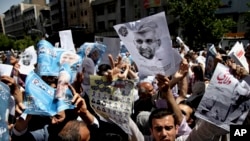Iran's six remaining presidential candidates are spending a final day trying to win over voters before Friday's election.
Campaigning in the presidential election ends Wednesday, giving Iranians a full day to consider their options before the polls open on Friday.
Iran's supreme leader, Ayatollah Ali Khamenei, has been calling for Iranians to show up to vote in large numbers.
In a speech Wednesday reported by the state-run ISNA news agency, he said "the strong presence of the Iranian nation will disappoint the enemy, make it reduce pressures and follow another path."
Iranians will choose the successor to current President Mahmoud Ahmadinejad from a slate dominated by conservatives loyal to the supreme leader.
Heading into the campaign, many analysts viewed Iran's chief nuclear negotiator, Saeed Jalili, as the likely favorite. But moderate candidate and former nuclear negotiator Hassan Rowhani has been gaining prominence in recent days.
On Tuesday, the lone reformist candidate in the race, Mohammad Reza Aref, dropped out. Aref and former reformist president Mohammad Khatami then announced their support for Rowhani.
The election winner will be faced with an economy struggling with high unemployment and inflation, crippled by international sanctions imposed over Iran's disputed nuclear program. Still, analysts say there will likely be little change in Iran's international posture.
While some candidates have voiced support for improved ties with the international community, major policy decisions rest with the supreme leader.
To win, a candidate must get 50 percent of the vote. If no one succeeds after the initial vote, a runoff election will be scheduled a week later.
Campaigning in the presidential election ends Wednesday, giving Iranians a full day to consider their options before the polls open on Friday.
Iran's supreme leader, Ayatollah Ali Khamenei, has been calling for Iranians to show up to vote in large numbers.
In a speech Wednesday reported by the state-run ISNA news agency, he said "the strong presence of the Iranian nation will disappoint the enemy, make it reduce pressures and follow another path."
Iranians will choose the successor to current President Mahmoud Ahmadinejad from a slate dominated by conservatives loyal to the supreme leader.
Heading into the campaign, many analysts viewed Iran's chief nuclear negotiator, Saeed Jalili, as the likely favorite. But moderate candidate and former nuclear negotiator Hassan Rowhani has been gaining prominence in recent days.
On Tuesday, the lone reformist candidate in the race, Mohammad Reza Aref, dropped out. Aref and former reformist president Mohammad Khatami then announced their support for Rowhani.
The election winner will be faced with an economy struggling with high unemployment and inflation, crippled by international sanctions imposed over Iran's disputed nuclear program. Still, analysts say there will likely be little change in Iran's international posture.
While some candidates have voiced support for improved ties with the international community, major policy decisions rest with the supreme leader.
To win, a candidate must get 50 percent of the vote. If no one succeeds after the initial vote, a runoff election will be scheduled a week later.
Loading...





